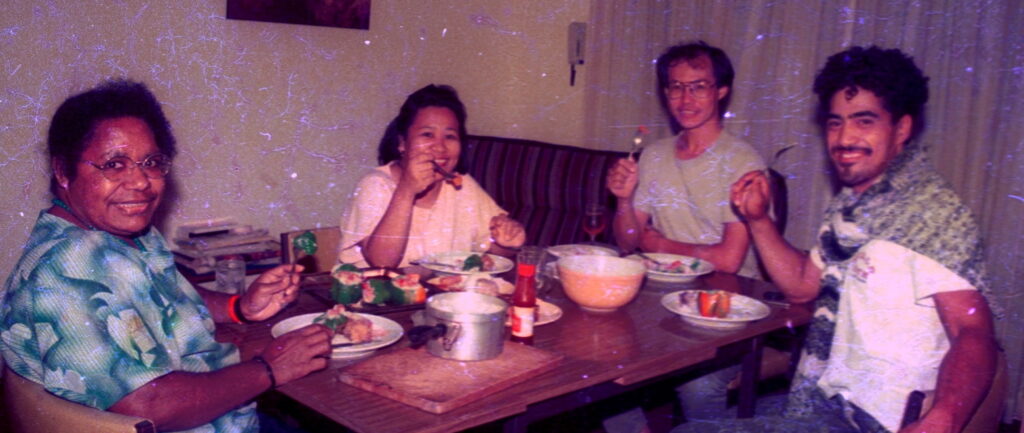
Colin Nicholas was a participant in the inaugural DTP training, held at the University of Sydney in 1990. Since then, he has accumulated over three decades of experience and service to Indigenous rights work in Asia.
Colin founded the Center for Orang Asli Concerns (COAC) in Malaysia in 1989. With a population of 210,000 in 2019, the Orang Asli – a collective term for the 19 Indigenous groups in Peninsular Malaysia – are amongst the poorest and most exploited communities in Malaysia today. COAC supports the community in human rights advocacy, assists community members in court cases, and builds the community’s capacity in lobbying and advocacy.
COAC’s work with the Orang Asli was recognised when it was awarded the United Nations Malaysia ‘Organization of the Year’ award in 2011 – for its “quiet, yet determined and sensitive manner in which the center has worked with unwavering integrity and independence in a critical area for Malaysian development.”
Colin was also a founding member of the Chiang Mai-based Asia Indigenous Peoples Pact (AIPP), with which he continues to be involved in various national and regional programmes.
Colin remembers that first training in 1990 in Sydney. It was a month-long programme and he still cherishes the memory of living, student-housing style, with Indigenous rights advocates from the region. “The experience of living with activists, politicians, liberation fighters and newbies like me, in a collaborative community environment was a highlight that was never forgotten.”
“During the regular drinking and dining sessions, our group even composed a song for DTP. It was based on the then-popular Tracy Chapman’s song ‘Talking ‘bout a revolution’. Ours was titled: ‘We’re talking people–and Liberation’. We performed it at our farewell dinner which was attended by some of our big-name trainers. It was an apt demonstration of our solidarity and cooperative-living.”
While his knowledge about the UN system was greatly enlightened by the course, Colin said that the most important aspect of the DTP training, to him, was how competency and critical thinking were fundamental in effective human rights advocacy. This was best illustrated, he said, by the session on media engagement conducted by a senior Australian journalist.
“I was so impressed by that session that I still remember his ‘teaching’ – about how to get the story across, starting with first convincing the news editors to read your press statements (by making sure you have all the fundamentals in the text and in how the statement is presented via font size, font type, title, contact information, etc.). It was so basic but it was fundamental learning for me and was the principle to be applied in all my future work – that is, understand the other side and tune your advocacy to that, with competency and facts.”
Another take-away lesson from his month-long live-in DTP course was that you can never begin to understand and empathise with a people until you’ve lived with them for some time.

Colin returned to Malaysia after that program, continuing his own work for, and with, Indigenous peoples in Malaysia and beyond in Asia. He has been an expert witness in several precedent-setting Orang Asli land rights cases, and has written several academic and popular books and articles on Orang Asli and Indigenous issues. He continues to support, and work with, Orang Asli communities through his center.
He has also, on occasion, returned to the DTP program as a presenter and trainer, especially on aspects of Indigenous peoples’ rights.
“I enjoy training. In the last DTP training session in Sabah where I was a resource person, some of the participants continued to interact with me after the course, seeking comment or clarification on various related issues. It is really a good feeling to know that some of your training is being internalized by some participants.”
DTP greatly values its relationship with Colin Nicholas and is deeply respectful of his contribution to promoting and protecting the rights of Indigenous peoples. Enabling the sharing of Colin’s knowledge and his reflections on a lifetime of service is important to DTP. His work continues to inform and inspire new generations of advocates.
DTP acknowledges the traditional custodians of the land on which we work, the Bedegal people of the Eora Nation. We recognise their lands were never ceded, and we acknowledge their struggles for recognition and rights and pay our respects to the Elders – past, present – and the youth who are working towards a brighter tomorrow. This continent always was and always will be Aboriginal land.
Aboriginal and Torres Strait Islander peoples should be aware that this website contains images or names of people who have passed away.
DTP acknowledges the traditional custodians of the land on which we work, the Bedegal people of the Eora Nation. We recognise their lands were never ceded, and we acknowledge their struggles for recognition and rights and pay our respects to the Elders – past, present – and the youth who are working towards a brighter tomorrow. This continent always was and always will be Aboriginal land.
Aboriginal and Torres Strait Islander peoples should be aware that this website contains images or names of people who have passed away.
Privacy Policy | Terms of Use | Disclaimer | Policies
© 2022 Diplomacy Training Program | ABN 31 003 925 148 | Web Design by Studio Clvr